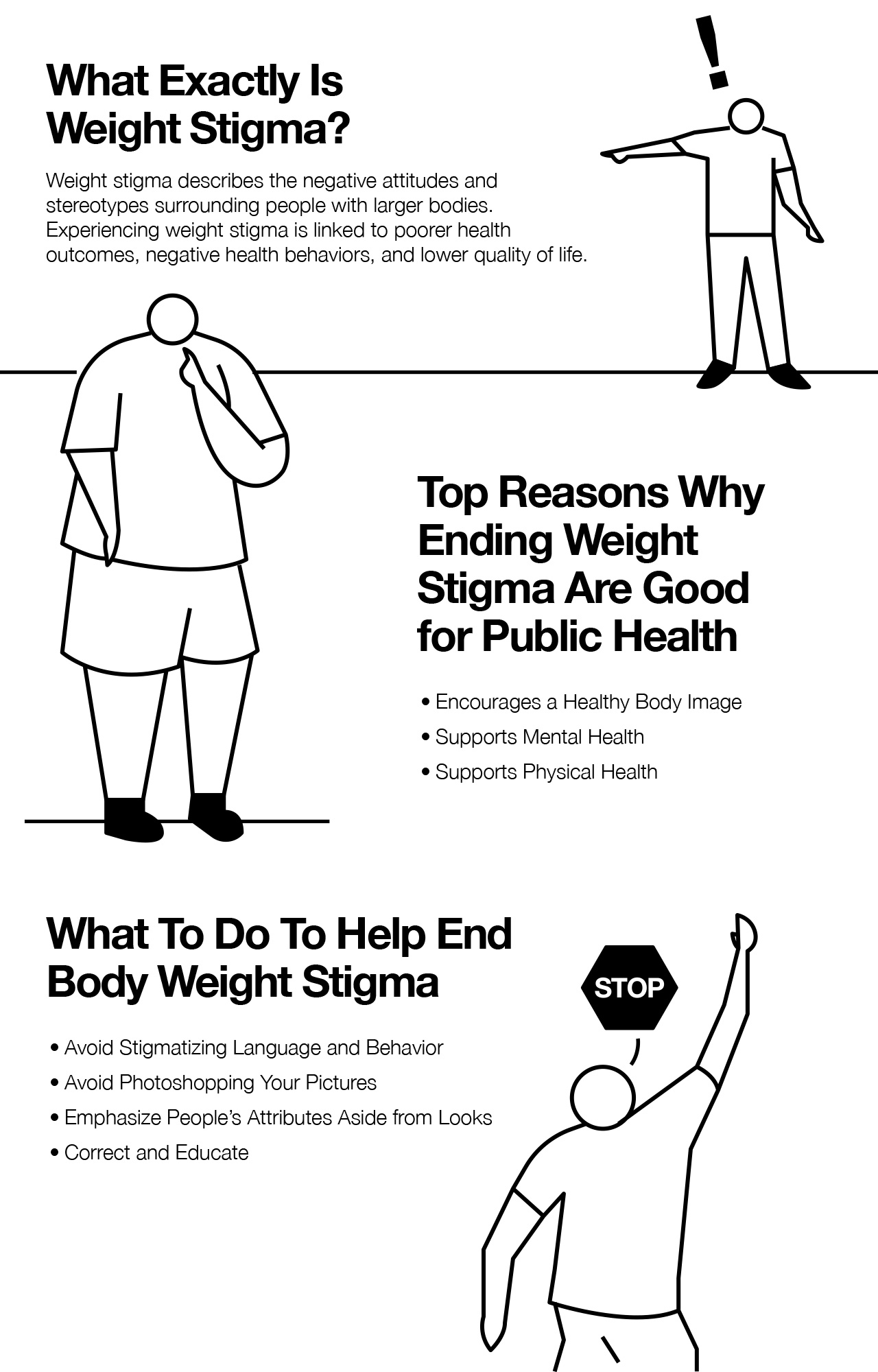Body positivity and ending weight stigma are the growing focus of public health efforts. There is some evidence that the health at every size movement helps produce some more sustainable results, removing weight stigma is psychologically beneficial and may encourage better food choices. Here we discuss why body positivity and ending weight stigma are important for public health.
What Exactly Is Weight Stigma?
Let’s dive into what weight stigma really is. Weight stigma describes the negative attitudes and stereotypes surrounding people with larger bodies. Discrimination towards overweight people also occurs because of experiences of weight stigma.
The World Obesity Federation works towards educating people about obesity, and summarizes the shaming, discrimination, and biases experienced by and directed at overweight people. (1)
Overweight people commonly experience biases that cause others to assume that they are lazy, unhygienic, unattractive, and lack intelligence. Such biases fuel unfair and cruel behavior and language. (1)
Experiencing weight stigma is linked to poorer health outcomes, negative health behaviors, and lower quality of life.
Research on the Effects of Weight Stigma
The research on the impact of weight stigma is astounding. An article by Dr. Tomiyama and colleagues and published in BMC Medicine explores the negative impacts of weight stigma on individuals. (2) The most shocking studies cited in the paper showcase the link between weight stigma and overall mortality risk. (2) The study found that independent of body mass index (BMI), adults who experienced weight discrimination had a 60% risk of death. (3)
Furthermore, experiencing discrimination and weight stigma contributes to poor mental health. Studies reveal that individuals experiencing weight discrimination are more likely to experience mental health disorders like depression and anxiety. (2)
The link between negative social experiences and subsequent stress may in part contribute to some of the poor health outcomes and risk of mortality that overweight adults experience. When we experience trauma and stress, the effects of these experiences are not limited to mental health. Negative experiences can throw off hormone levels, increase oxidative stress, and worsen inflammation, taking a toll on overall health and well-being. Weight stigma and weight bias are also present in healthcare settings, which may impact the type of care that overweight patients receive from healthcare professionals. (4)
Additionally, research shows that weight bias internalization (WBI) is linked to poor health outcomes. One of the effects of weight stigma is WBI. Dr. Rebecca L. Pearl and Dr. Rebecca M. Puhl from the University of Pennsylvania and the University of Connecticut Rudd Center for Food Policy and Obesity conducted a systematic review examining the link between WBI, health outcomes, and interventions for WBI. (5) WBI describes self-deprecation and the assignment of negative stereotypes to oneself. Results revealed that WBI correlates strongly with poor mental health outcomes. (5)
How Did We Get Here?
As obesity increases in prevalence, so have trends in extreme dieting and fad diets. Simultaneously, marketing and media constantly praise ultra-skinny body types. Social media, in particular, often gives a platform to influencers giving nutrition advice without proper certification, while posting photoshopped images of themselves. On top of that, in marketing and advertisements, we rarely see people represented with all of the natural “imperfections” that most of us have and that are part of what makes us human. For example; hairy legs, excess weight, and cellulite.
The result is millions of people in the United States suffering from some kind of body dysmorphia, meaning they don’t like what they see when they look in the mirror. The constant bombardment with unscientific nutrition advice and glorification of one body type causes individuals to take drastic measures to try to achieve an ultimately unattainable goal.
Extreme dieting, weight stigma, body dissatisfaction, and portrayals of unattainable beauty standards have permeated American culture. Consequently, society is also seeing a record number of cases of eating disorders like anorexia, bulimia, and binge eating disorder. Orthorexia is also becoming higher in prevalence and is characterized by an unhealthy obsession with health and wellness.
As diet culture has grown, so has a developing movement that encourages body positivity, intuitive eating, and gentle nutrition, while fighting against weight stigma. Find out the top reasons why this movement is great for public health.
Encouraging a Healthy Body Image
A healthy body image is a key to self-acceptance, self-confidence, and overall mental health. Regardless of weight status, it is critical to practice self-love and self-care. It’s much easier to do so in the absence of weight stigma.
Supporting Mental Health
We know that weight-related stigma is a risk factor for negative health outcomes. Encouraging body acceptance and self-love is connected to better mental health and helps reduce the risk of depression and anxiety.
Supporting Physical Health
As described above, mental health and well-being are closely tied to physical health. Supporting body acceptance and mental health for everyone regardless of size or shape is critical for mental health improvement. Breaking down obesity stigma is an important step in making a positive step towards better health and well-being for individuals with a higher weight.
What Can You Do to Help End Body Weight Stigma?
As a society, we are still far from the end of weight stigma. Because weight stigma is a cultural construct, it’s impossible for one person to bring it to an end. Instead, individuals can take small actions that yield significant results over time. Here are a few steps you can take to help normalize a range of body shapes and sizes, in order to stop weight bias.
1. Avoid Stigmatizing Language and Behavior
To help break down negative attitudes and biases surrounding weight, it’s important to take note of the language that you use on a regular basis. An article published in Frontiers in Psychology explores the negative impact that language has on obesity in general. The article describes how the usage of certain language to describe and label larger people creates a divide between “them” and “us.” This division can lead the way to stigmatizing behavior. (6)
2. Avoid Photoshopping Your Pictures
It’s easy for all of us to get sucked into the whirlwind of social media. Platforms like Instagram, Facebook, and TikTok make it easy to pose for pictures, photoshop images, and make appearance seem perfect and unrealistic. It’s become commonplace for individuals to photoshop their waistlines and legs to appear thinner than they actually are. This trend in posting unrealistically perfect images has resulted in comparing oneself to fake images on social media. The result is low self-esteem, especially among adolescents. Posting photoshopped images to appear thinner also sends the message that being thinner is somehow better and more acceptable.
It is important to note that backlash has arisen in response to photoshopped images. Many people are recognizing the importance of normalizing real bodies, which vary considerably in both size and shape. One positive trend is posting “Instagram vs. reality” pictures, which underscore the fact that posts on Instagram often represent a perfectly posed and filtered highlight reel of a person’s life.
3. Emphasize People’s Attributes Aside from Looks
Society tends to be very visual. In media and entertainment, we are constantly presented with airbrushed images of perfect-looking people. As a natural result, we compare ourselves to unrealistic images.
We can counter the value placed on looks by consciously emphasizing other features. Moving emphasis away from a person’s looks and weight gain or weight loss is a helpful strategy for addressing weight stigma. Instead of complimenting a person’s body shape or weight, emphasize the person’s sharp intellect, kindness, humor, or character.
4. Correct and Educate
If you hear friends or family members making ignorant comments regarding weight and obesity, it’s important to kindly correct them. Share with them the connection between weight stigma and a person’s health and well-being. It’s crucial to play a part in shutting down negative stereotypes attached to people with larger bodies.
Things to Keep in Mind
If you’re concerned about your health and weight, it’s important to make an appointment with your healthcare provider. A registered dietitian is also an excellent resource for ensuring that you have healthy eating behaviors that support your specific needs.
Conclusion: Why Body Positivity and Ending Weight Stigma Are Good for Public Health
Weight stigma is a serious cause of discrimination and negative social experiences across the population. It is clear that stereotypes tied to larger body sizes are associated with negative health consequences. Slowly shifting the tide towards body positivity and breaking down weight stigma are keys to promoting improvements in public health.

References:
(1) https://www.worldobesity.org/what-we-do/our-policy-priorities/weight-stigma
(2) https://bmcmedicine.biomedcentral.com/articles/10.1186/s12916-018-1116-5
(3) https://www.ncbi.nlm.nih.gov/pmc/articles/PMC4636946/
(4) https://journalofethics.ama-assn.org/article/weight-bias-health-care/2010-04























